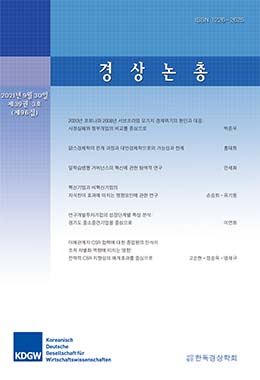현재 진행 중인 COVID-19는 전 세계적인 금융 패닉을 불러오며 글로벌 경제위기를 발생시켰다. 이에 본 연구는 현 상황을 효과적으로 극복하는 방안으로 2008년 서브프라임 모기지와 2020년 COVID-19 인한 경제위기를 종합적으로 비교하여 분석하였다.
분석 결과 이 두 경제위기의 원인을 각각 도덕적 해이와 부정적 외부효과로 인한 시장실패로 검토하였으며, 이를 해결하기 위한 정부개입의 양상을 주요 경제 지표와 대응 행태를 중심으로 살펴보았다. 2008년 서브프라임 모기지 시 정부개입은 기업과 금융기관의 구조조정 실패로 국민과 기업 모두에게 피해를 주는 부작용을 초래하여 정부실패로 평가된다. 반면 여전히 진행 중이긴 하지만 COVID-19는 발생 초기부터 각국 정부들의 신속한 국제적 공조 및 경제정책 등을 통해 피해를 최소화 할 수 있었고, 이는 정부개입의 성공 요인으로 평가된다.
이러한 코로나 위기상황 극복을 위해 향후 정부개입의 목표는 성장촉진이나 분배구조 개선과 같은 단순한 경제정책이 아니라 현재 위기상황에 가장 신속한 대응 방안을 마련하는 것이 효과적이다. 따라서 가계와 기업 등에 안정적인 자금지원과 원활한 유동성 공급이 이루어질 수 있는 방안을 검토해야 한다. 또한 바이러스 변이 등의 또 다른 팬데믹 사태에 대비하여 다양한 이해관계자가 참여하는 강력한 국제공조 시스템 구축과 같은 정부의 협력과 개입이 효과적으로 이루어질 수 있도록 준비가 필요하다.
오늘날 경제위기는 그 원인이 매우 다양하고 파급효과로 인한 피해 역시 과거와는 비교할 수 없을 정도로 심각하다. 본 연구의 대상인 COVID-19로 인한 경제위기가 아직 완전히 종식되지 않은 상황에서 정부의 개입과 대응을 몇 가지 사례를 통해 평가한 한계를 가지고 있다. 하지만 본 연구는 과거의 사례를 타산지석으로 삼아 현 코로나 경제위기를 체계적으로 진단하고, 그에 따른 효과적인 대응 방안을 제시하였다는 점에서 연구 의의 또한 존재한다.
The ongoing COVID-19 crisis has created a global economic crisis, bringing about global financial panic. In an effort to effectively overcome the current crisis, this study comprehensively compared and analyzed the subprime mortgage crisis in 2008 and the economic crisis caused by COVID-19 in 2020. As a result of the analysis, it was found that the two economic crises were caused by market failure due to moral hazard and negative externalities, respectively, and aspects of government intervention to solve the crisis were evaluated in terms of major economic indicators and responses. Government intervention in 2008 during the subprime mortgage crisis was evaluated to be a since it adversely affected both the public and businesses due to the failure of restructuring by corporate and financial institutions. On the other hand, although it is still ongoing, rapid international cooperation and economic policies by governments since the beginning of the COVID-19 outbreak has been able to minimize damage, which is considered a successful factor in government intervention.
To overcome the coronavirus crisis, the goal of government intervention in the future is not just economic policies such as growth promotion or improvement of distribution structure, but to come up with the fastest countermeasures to the current crisis. Therefore, governments should consider ways to provide stable funding and smooth liquidity for households and businesses. It is also necessary to prepare for effective government cooperation and intervention, such as the establishment of a strong international cooperation system involving various stakeholders, in preparation for another pandemic such as virus mutations.
The causes of economic crisis today are diverse, and the damages caused by ripple effects are also much more serious. As the economic crisis caused by COVID-19, the subject of this study, continues to affect the world, this study is limited in that it has positively evaluated government intervention and response with a limited number of examples. However, this study is meaningful in that it has systematically diagnosed the current economic crisis caused by COVID-19 by using past cases of failure as lessons to learn from and proposed effective countermeasures.


